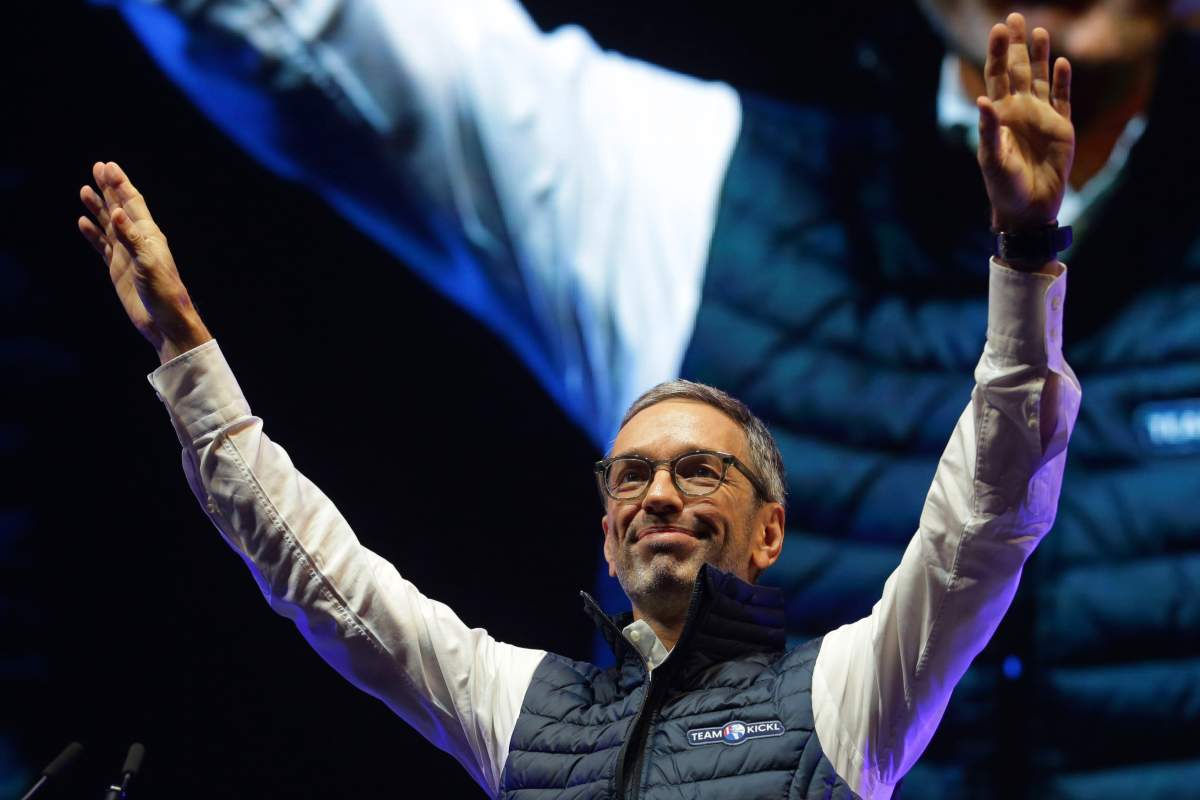The far-right Freedom Party had a lead over the governing conservatives in Austria’s election on Sunday and was well-placed for its first win in a national parliamentary vote, a projection showed. But its chances of governing were unclear.

The projection for ORF public television, based on partial counting, put support for the Freedom Party at 29 per cent in the election and Chancellor Karl Nehammer’s Austrian People’s Party at 26.2 per cent. The centre-left Social Democrats were in third place with 20.7 per cent.
Herbert Kickl, a former interior minister and longtime campaign strategist who has led the Freedom Party since 2021, wants to become Austria’s new chancellor on the back of the first far-right national election win in post-World War II Austria.
The far right has tapped into voter frustration over high inflation, the war in Ukraine and the COVID-19 pandemic. It has also built on worries about migration.
In its election program, titled “Fortress Austria,” the Freedom Party calls for “remigration of uninvited foreigners,” for achieving a more “homogeneous” nation by tightly controlling borders and suspending the right to asylum via an “emergency law.”

Get breaking National news
The Freedom Party also calls for an end to sanctions against Russia, is highly critical of Western military aid to Ukraine and wants to bow out of the European Sky Shield Initiative, a missile defence project launched by Germany. Kickl has criticized “elites” in Brussels and called for some powers to be brought back from the EU to Austria.
But to become Austria’s new leader, he would need a coalition partner to command a majority in the lower house of parliament — and rivals have said they won’t work with Kickl in government.
“The voter has spoken. Change is wanted in our country,” Freedom Party general secretary Michael Schnedlitz said, though he acknowledged that “we don’t have the final result yet.”
People’s Party general secretary Christian Stocker conceded that “we didn’t achieve first place” but said his party had come back from lower poll ratings. And he reiterated Nehammer’s often-stated refusal to form a coalition with Kickl — “that was the case yesterday, and it is the case today and it will still be the case tomorrow.”
More than 6.3 million people age 16 and over were eligible to vote for the new parliament in Austria, a European Union member that has a policy of military neutrality.
Kickl has achieved a turnaround since Austria’s last parliamentary election in 2019. In June, the Freedom Party narrowly won a nationwide vote for the first time in the European Parliament election, which also brought gains for other European far-right parties. The party is a long-established political force but Sunday’s projected result, if confirmed, would be its best yet in a national parliamentary election — beating the 26.9 per cent it scored in 1999.
In 2019, its support slumped to 16.2 per cent after a scandal brought down a government in which it was the junior coalition partner. Then-vice chancellor and Freedom Party leader Heinz-Christian Strache resigned following the publication of a secretly recorded video in which he appeared to offer favours to a purported Russian investor.
The leader of the Social Democrats, a party that led many of Austria’s post-World War II governments, positioned himself as the polar opposite to Kickl. Andreas Babler ruled out governing with the far right and has labeled Kickl “a threat to democracy.”
While the Freedom Party has recovered, the popularity of Nehammer’s People’s Party, which currently leads a coalition government with the environmentalist Greens as junior partners, declined sharply compared with 2019. The Greens’ support also was projected to drop to just under 9 per cent, and the outgoing coalition appeared to be well short of a majority.
During the election campaign, Nehammer portrayed his party, which has taken a tough line on immigration in recent years, as “the strong centre” that would guarantee stability amid multiple crises.
But those crisis, ranging from the COVID-19 pandemic to Russia’s invasion of Ukraine and resulting rising energy prices and inflation, also cost it support. The government also angered many Austrians in 2022 with a short-lived coronavirus vaccine mandate, the first in Europe.
But the recent flooding caused by Storm Boris that hit Austria and other countries in Central Europe brought the environment back into the election debate and may have helped Nehammer slightly narrow the gap with the Freedom Party.
The People’s Party is the far right’s only way into government.
Nehammer has repeatedly excluded joining a government led by Kickl, describing him as a “security risk” for the country, but hasn’t ruled out a coalition with the Freedom Party in and of itself, which would imply Kickl renouncing a position in government.
The likelihood of Kickl agreeing to such a deal if he wins the election is very low, leading political scientist Peter Filzmaier said before the election.
The most probable alternative would be an alliance between the People’s Party and the Social Democrats — with or without the liberal Neos, which took about 9 per cent of the vote.










Comments
Want to discuss? Please read our Commenting Policy first.